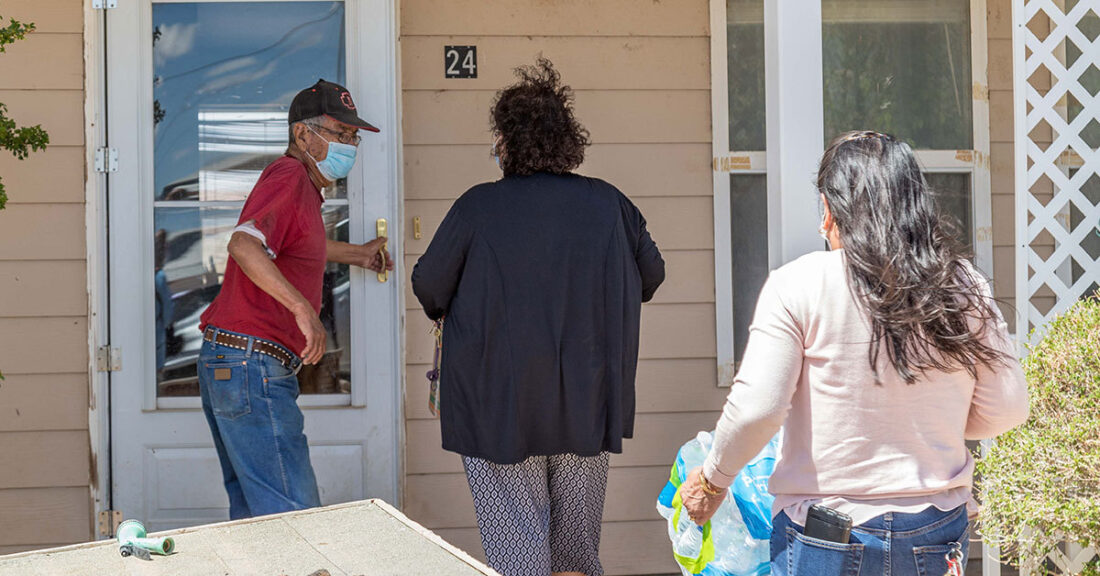Responding to COVID-19 Through Relationships and Cultural Understanding

Photo credit: Nina Mayer Ritchie
The COVID-19 crisis has disproportionately affected Native Americans. By leveraging its relationships and understanding of tribal culture, the Johns Hopkins Center for American Indian Health is doing its part by providing food, water, personal protective equipment and other essential home health items, as well as COVID-19 testing and contact tracing efforts.
The response effort, funded in part by the Annie E. Casey Foundation, is deploying the Center’s workforce, tribal collaborators, relationships with national organizations and providers that have adopted Family Spirit — the Center’s evidence-based early childhood home visiting program developed by and for Native Americans — to channel relief resources and culturally meaningful communications to tribal communities across the United States.
Prior to the coronavirus pandemic, Native Americans suffered higher rates of infectious disease severity and death than any other population in the United States. Many of those served by the Center — which is based in the Johns Hopkins Bloomberg School of Public Health — live in overcrowded, multi-generational homes that make being isolated a challenge. An estimated 80% of children in Native communities rely on receiving breakfast and lunch from now-closed schools. In the Navajo Nation alone, more than 30% of families don’t have a tap or indoor plumbing at home, making hand washing difficult.
Here’s how the Center is responding:
- Keeping children and families well-nourished. Because stay-at-home orders and a lack of at-home refrigeration make it challenging for families to have enough food on hand, the Center is providing boxes with familiar foods that are healthful and non-perishable.
- Delivering basic at-home health supplies. The Center is conducting regular check-ins to gauge family needs and distribute disinfectants, diapers, wipes and thermometers. The Center also is delivering hand-washing stations and bottled water to families that do not have running water.
- Providing personal protective equipment for responders and community members. The Center is distributing face masks, face shields, gloves and gowns to address a shortage of equipment for medical care providers, community-based first responders and community members.
- Employing Apache and Navajo staff. To enable ongoing protection, the Center is employing reservation-based staff to sew cloth masks and reusable gowns, and to build and distribute hand-washing stations. An additional goal: planting the seeds for sustainable small businesses.
- Accounting for mental and psychological health inequities. The history of infectious diseases — including those intentionally introduced as an act of genocide — and the loss of Indigenous lands, people and culture have resulted in generations of trauma that the COVID-19 crisis stands to amplify. The Center’s public health approach addresses the psychological toll of COVID-19, reducing anxiety and promoting resilience.
Providing culturally relevant health communications
For Native populations, the effects of COVID-19 extend beyond physical and mental health — they threaten the endurance of historic traditions. In many Native communities, elders are the wisdom keepers, responsible for educating youth on traditional linguistic and cultural practices. “Over the past 30 to 40 years, and after many years of suppression by non-Native forces, we’ve seen a large push among Native communities to revive language and traditional cultural practices,” says Allison Barlow, director of the Center. “COVID-19 threatens to interrupt this revival by taking the elders.”
To inform a culturally relevant response, the Center is using programs like Family Spirit — whose replication and adaptation Casey has supported — to do more than disease containment. With a foothold in 140 tribal communities across 21 states, Family Spirit gives the Center an established network to reach Native children and families across the country. Working with a Native American collaborative, the Center created the children’s book, Our Smallest Warriors, Our Strongest Medicine: Overcoming COVID-19, a re-telling of My Hero is You.
“Because of the reach and community trust they’ve achieved over their long-term development of Family Spirit, the Center was in a strong position to provide the response critically needed during this pandemic, while continuing to build community well-being after the immediate crisis ends,” says Cynthia Weaver, a Casey senior associate overseeing the Center’s grant.
The book is being distributed to every family that Family Spirit serves. The Center is also conducting surveys to gather families’ responses to the book, the results of which will be used to inform future Family Spirit initiatives and psychological aid.
In addition, the Center is tracking deliveries, assisting with expanded testing and contact tracing, and providing tribal partners with data to inform safe re-openings. As the Center looks to the next phase of coronavirus response, it continues to expand efforts to address the impact of COVID-19 on behavioral and mental health. In addition, the Center seeks to promote development of infrastructure to address access to food and safe water, while also engaging with youth, families and communities in developing community resources.
Learn how culturally relevant programs contribute to child welfare prevention






